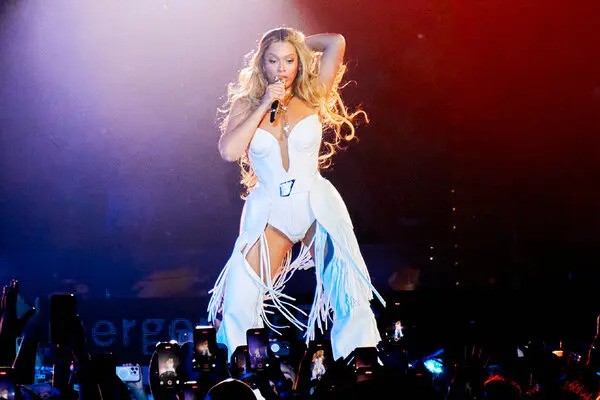As the lights dimmed and tens of thousands of fans filled Atlanta’s Mercedes-Benz Stadium on July 10, the energy was electric. Beyoncé, global icon, genre-bending artist, and one of the most fiercely private entertainers in the world, was set to take the stage for the first of four nights in the city. The crowd knew they were about to witness something spectacular—what they didn’t know was that behind the curtain, chaos was unfolding.
Just 48 hours before the kickoff of her Atlanta performances on the “Cowboy Carter and the Rodeo Chitlin’ Circuit Tour,” an incident occurred that sent ripples through the star’s tight-knit creative team. A police report filed with the Atlanta Police Department revealed that unreleased music, detailed production plans, and other sensitive tour material were stolen in a brazen break-in. The theft has raised serious questions about security, the vulnerability of digital content, and the ongoing challenges of keeping creative work under wraps in the age of instant leaks.
According to the police report obtained by USA TODAY, the incident occurred on the evening of July 8. Christopher Grant, Beyoncé’s longtime choreographer, and Diandre Blue, one of her professional dancers, had parked their black rental Jeep Wagoneer in a downtown Atlanta parking deck. When they returned, they found that the vehicle’s rear window had been shattered and two suitcases were missing.
Among the stolen items were not just personal belongings like designer sunglasses, clothing, laptops, and a pair of AirPods Max headphones, but also something far more valuable: hard drives containing unreleased Beyoncé music, footage and plans for upcoming shows, and confidential set lists for both past and future performances.
In the police report, Grant explained the gravity of the situation, noting that the hard drives were “watermarked”—an indication they contained proprietary and protected content belonging to one of the world’s most closely guarded musical acts. The implication of such a theft extends far beyond financial loss. For a star like Beyoncé, whose work is deeply curated and carefully rolled out, an information leak could derail months—if not years—of artistic planning.
The “Cowboy Carter” tour marks Beyoncé’s boldest creative venture yet. Building on the momentum from her 2022 “Renaissance” tour, which celebrated house, disco, and ballroom culture, “Cowboy Carter” explores the roots of Americana, soul, country, and gospel. It’s a political, personal, and musical statement rolled into a high-production spectacle.
Debuting at SoFi Stadium in Los Angeles on April 28, the tour features an ambitious 39-song set list that weaves together past hits, new compositions, and collaborations across genres. According to fans and critics alike, each show is a near-perfect execution of visual art, choreography, and musical range.
What makes this tour particularly unique is its emphasis on Black Southern identity—an exploration of culture that Beyoncé has long championed but is now spotlighting more explicitly than ever before. The choreography, costumes, and multimedia elements are all part of a cohesive narrative. That narrative—crafted carefully over months, maybe even years—was jeopardized the moment those hard drives were stolen.

While thefts from touring artists are not new, the scale and specificity of this incident have made it especially alarming for those in the music industry. Leaks have historically been the bane of artists from the early 2000s Napster era to today’s digital streaming wars. But when an artist of Beyoncé’s stature is affected, the repercussions are felt industry-wide.
Sources close to the tour team say Beyoncé herself was not present during the time of the theft. However, she was immediately informed and took steps to ensure show continuity while investigators searched for leads. Internally, there were concerns about the safety and integrity of the stolen files. Even watermarked and encrypted hard drives can be hacked, raising fears of premature song leaks, bootlegged footage, or, worse, misinformation campaigns based on altered content.
“This isn’t just about songs leaking,” said one music executive who asked to remain anonymous. “It’s about an entire artistic vision being compromised.”
Behind the headlines and speculation, it’s important to recognize the personal toll on those directly involved. For Christopher Grant and Diandre Blue, the theft represents more than just the loss of a few pieces of hardware. It’s the erasure of countless hours of creativity, collaboration, and work.
Choreography for a Beyoncé tour is not just background movement—it’s storytelling in motion. Grant’s role involves coordinating dozens of dancers, aligning movements with digital backdrops, syncing with costume changes, and adhering to tightly managed time codes for lighting and special effects. Losing plans for those performances just days before showtime is the kind of disruption that could paralyze a lesser production.
And yet, when the lights came up on July 10, fans were none the wiser.
Despite the turmoil backstage, Beyoncé delivered three consecutive performances in Atlanta on July 10, 11, and 13 with her signature precision and flair. Her final Atlanta appearance was scheduled for July 14, rounding out what has been one of the most talked-about stops on the tour so far.
Attendees reported no visible hiccups in the show’s flow—evidence of the professionalism and resilience of her team. If any adjustments had to be made due to the theft, they were invisible to the average concertgoer. This is a testament not just to Beyoncé’s mastery as a performer but also to the preparation and adaptability of her crew.
As of this writing, the Atlanta Police Department confirmed the investigation is ongoing. Detectives are reportedly pursuing multiple leads, including security footage from the parking garage, digital tracking of stolen devices, and witness accounts.
In the meantime, Beyoncé’s team has likely taken additional steps to secure their digital assets, both in transit and on-site. While details of these measures are confidential, experts in tour production suggest encrypted drives, GPS tracking of key items, cloud-based backups, and stricter personnel protocols are now standard practice for artists at this level.
The incident has reignited a broader industry conversation about how to protect artistic intellectual property in an increasingly digital, decentralized world. In the past, a stolen CD or notebook might be an inconvenience. Today, a single hard drive can contain enough material to launch—or sabotage—an entire tour.
For someone like Beyoncé, whose brand is synonymous with surprise releases and carefully planned rollouts, a breach of this magnitude is not just an artistic threat—it’s a business risk. Her team is known for its secrecy, tight NDAs, and intense loyalty, which makes this kind of external breach all the more jarring.
Some music insiders speculate that this might prompt artists to reconsider how tour materials are transported. Rather than carrying hard drives between cities, some are considering more cloud-based storage options protected by multi-factor authentication. Others suggest going analog: handwritten notes, printed choreography sheets, even secure couriers for physical items.
News of the theft, while underreported compared to other entertainment headlines, has started to make its way into fan communities online. Reactions have ranged from disbelief to concern. Many fans expressed outrage that someone would target artists working hard to bring joy and creativity to audiences.

“We don’t deserve Beyoncé. The woman is out here redefining genres, and people are out here trying to steal from her team,” tweeted one fan.
Others urged fellow members of the BeyHive not to share or support any leaked material that might surface. “If you see anything online that claims to be leaked from her Atlanta show—don’t click it, don’t share it,” another user posted on Instagram. “That’s not fandom. That’s sabotage.”
In the grand scheme of Beyoncé’s career, this incident may end up being a footnote—an obstacle overcome with grace and precision, much like countless other challenges she’s faced. But it also serves as a reminder of the unseen pressures that artists endure to bring their vision to life. The glitz and glamour of a stadium tour mask the meticulous planning, long hours, and logistical hurdles that go into each night’s performance.
As the “Cowboy Carter” tour rolls on to its next stop, Beyoncé and her team will undoubtedly continue to dazzle audiences. Still, behind the glittering curtain, a real-world lesson about digital vulnerability and artistic resilience plays out—a reminder that even for the world’s biggest stars, security is never guaranteed.










